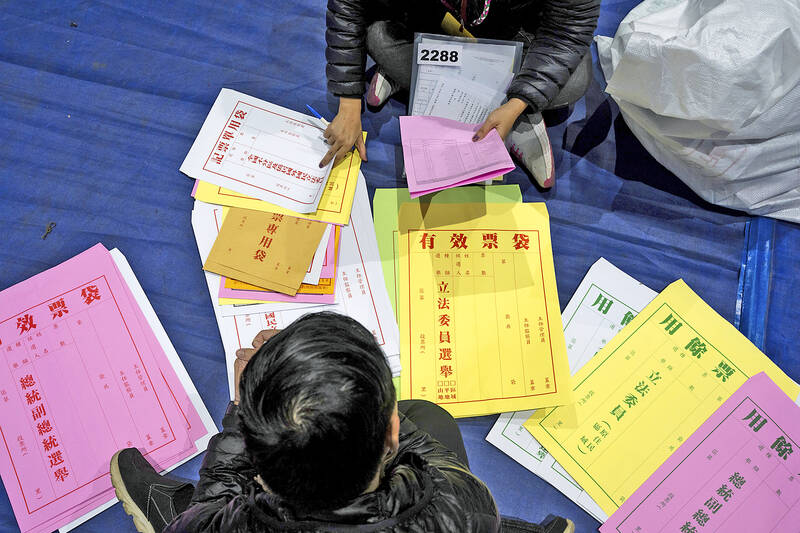About 1.02 million first-time voters are eligible to cast their ballots for president today, the Central Election Commission (CEC) said yesterday as it issued a reminder on election-day rules.
A total of 19,548,531 people would be eligible to cast their ballots for president, with an additional 17,476 eligible to do so for legislators-at-large, due to a two-month difference in the residency requirements for the elections, the CEC said.
Campaigning of any kind was prohibited from midnight, including sharing content on messaging apps such as Line and social media such as Facebook in support of a candidate or party, CEC Chairman Lee Chin-yung (李進勇) said.

Photo: AP
Offenders would face a fine of NT$100,000 to NT$1 million (US$3,212 to US$32,124), while political parties, candidates or their agents who contravene the regulation would face a fine of NT$200,000 to NT$2 million, Lee said.
On election day today, people should bring their national ID card, name stamp and election notice to the polling station listed on the notice, he said.
They should be quiet at the polling site and not engage in activities that might influence or prevent voting within 30m of the site, he said.
People who are noisy or engage in other activities that might influence voting behavior would face a penalty of up to one year in prison commutable to a NT$15,000 fine if they refuse to comply with orders from security at the polling site, Lee said.
People should use the markers provided at the voting site to indicate their preferred candidates on the ballot and should not use a stamp, which would invalidate the ballot paper, he said.
Recording devices are not allowed in polling booths, except for communications devices that have been switched off, he said, adding that breaching the regulation is punishable by a fine of NT$30,000 to NT$300,000.
Destruction of a ballot is punishable by a NT$5,000 to NT$50,000 fine, he said.
Taking a ballot offsite is punishable by a one-year prison sentence, commutable to a fine of up to NT$15,000, Lee said.
The CEC has arranged 240,000 election workers at 17,795 polling stations, he said.
The tallying process is transparent and governed by strict rules to ensure fairness, he said, adding that monitors were selected by the parties with presidential candidates.
Election workers must strictly follow the procedures for counting votes, he added.

MAKING WAVES: China’s maritime militia could become a nontraditional threat in war, clogging up shipping lanes to prevent US or Japanese intervention, a report said About 1,900 Chinese ships flying flags of convenience and fishing vessels that participated in China’s military exercises around Taiwan last month and in January last year have been listed for monitoring, Coast Guard Administration (CGA) Deputy Director-General Hsieh Ching-chin (謝慶欽) said yesterday. Following amendments to the Commercial Port Act (商港法) and the Law of Ships (船舶法) last month, the CGA can designate possible berthing areas or deny ports of call for vessels suspected of loitering around areas where undersea cables can be accessed, Oceans Affairs Council Minister Kuan Bi-ling (管碧玲) said. The list of suspected ships, originally 300, had risen to about

DAREDEVIL: Honnold said it had always been a dream of his to climb Taipei 101, while a Netflix producer said the skyscraper was ‘a real icon of this country’ US climber Alex Honnold yesterday took on Taiwan’s tallest building, becoming the first person to scale Taipei 101 without a rope, harness or safety net. Hundreds of spectators gathered at the base of the 101-story skyscraper to watch Honnold, 40, embark on his daredevil feat, which was also broadcast live on Netflix. Dressed in a red T-shirt and yellow custom-made climbing shoes, Honnold swiftly moved up the southeast face of the glass and steel building. At one point, he stepped onto a platform midway up to wave down at fans and onlookers who were taking photos. People watching from inside

Japan’s strategic alliance with the US would collapse if Tokyo were to turn away from a conflict in Taiwan, Japanese Prime Minister Sanae Takaichi said yesterday, but distanced herself from previous comments that suggested a possible military response in such an event. Takaichi expressed her latest views on a nationally broadcast TV program late on Monday, where an opposition party leader criticized her for igniting tensions with China with the earlier remarks. Ties between Japan and China have sunk to the worst level in years after Takaichi said in November that a hypothetical Chinese attack on Taiwan could bring about a Japanese

STREAMLINED: The dedicated funding would allow the US to transfer equipment to Taiwan when needed and order upgraded replacements for stockpiles, a source said The US House of Representatives on Thursday passed a defense appropriations bill totaling US$838.7 billion, of which US$1 billion is to be allocated to reinforcing security cooperation with Taiwan and US$150 million to replace defense articles provided to the nation. These are part of the Consolidated Appropriation Act, which the US House yesterday passed with 341 votes in favor and 88 against. The act must be passed by the US Senate before Friday next week to avoid another government shutdown. The US House Committee on Appropriations on Monday unveiled the act, saying that it allocates US$1 billion for the Taiwan Security Cooperation Initiative